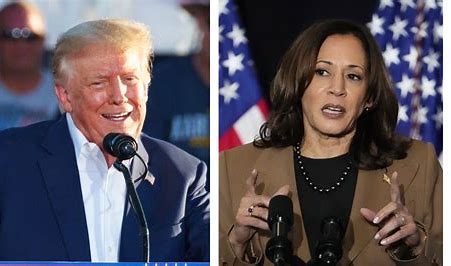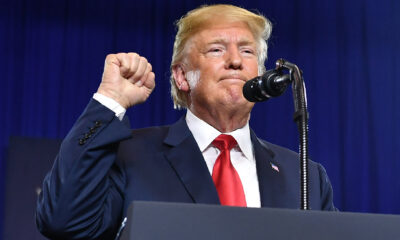Top Stories
#USElection2024:How the U.S. election outcome might affect investing in Africa

The outcome of the United States’ presidential elections usually influences the direction of investments and economic trends on a global scale.
However, historically, they have had less impact in Africa, where a bipartisan policy consensus has largely prevailed in Washington.
From one administration to the next, Washington’s basic strategy for the continent hasn’t changed much.
According to Statista, the United States exported around $28.69 billion to Africa in 2023. The world’s largest economy pledged to invest $55 billion in Africa over a three-year period. This policy specifically seeks to offset China’s increasing influence, which has significantly bolstered investments and infrastructure development.
The U.S. presidential election in 2024 could influence investment in Africa through several channels:
Trade Policies and Economic Relations: The outcome of the U.S. election might affect trade relations with Africa, particularly through policies like the African Growth and Opportunity Act (AGOA). Depending on who wins, there could be shifts in trade priorities, with potential changes in tariffs, trade agreements, or support for African exports such as textiles, cut flowers, and other products.
For instance, a more isolationist policy could reduce U.S. engagement, while a policy aimed at fostering global trade might enhance opportunities for African exports. Trump’s “America First” approach historically leaned towards protectionism, characterized by tariffs and trade negotiations aimed at protecting U.S. industries. This could mean less favorable trade terms for African countries under programs like AGOA, potentially affecting exports from Africa to the U.S. Investors might perceive this as a risk, depending on how these policies are renegotiated or maintained.
Foreign Direct Investment (FDI): Different administrations have distinct approaches to overseas investment. A victory for Kamala Harris might encourage more U.S. companies to invest in emerging markets, including Africa, potentially leading to increased job creation, technology transfer, and skill development in regions like South Africa. Conversely, a different approach might prioritize domestic investment or focus on other regions, potentially reducing FDI flows to Africa. Trump has expressed skepticism towards foreign aid, which could translate into reduced U.S. investment or development aid in Africa. However, if Trump continues or expands initiatives like “Prosper Africa,” aimed at increasing trade and investment with Africa, there might be opportunities for investors. The unpredictability of policy continuity could make investors cautious.
Geopolitical Influence and Stability: The U.S. election’s impact on global geopolitics can affect the stability of African markets. For example, a continuation of strong U.S. foreign policy engagement might deter other global powers from exerting undue influence in Africa, which could stabilize markets. Conversely, a less engaged U.S. might lead to increased competition or conflict in Africa, potentially deterring investors due to uncertainty.
Financial Markets and Economic Policies: The election’s influence on U.S. interest rates, inflation, and the dollar’s value could indirectly affect African markets. Lower interest rates or a weaker dollar might make African assets more attractive for U.S. investors seeking higher yields. Conversely, higher rates or a stronger dollar could draw capital away from Africa.
Direct Policy Initiatives: Specific policies or initiatives toward Africa, such as aid, debt relief, or new trade deals, could be influenced by the election. For instance, support for initiatives like the Power Africa program or more robust responses to conflicts could directly impact investment environments. Trump’s stricter immigration policies could affect African countries, potentially reducing remittances, which are significant for many African economies. This might indirectly influence investment by affecting economic stability or growth forecasts.
In summary, while the direct impact of the U.S. election on investing in Africa might not be as dramatic as in other regions due to Africa’s diverse economic landscape, it could significantly shape trade agreements, FDI flows, geopolitical stability, and investor sentiment. If the new administration focuses on resource extraction or infrastructure in Africa to counterbalance China’s influence, there could be increased investment in sectors like mining, oil, or renewable energy, especially where these resources are abundant.
The variability in outcomes suggests that investors might need to prepare for different scenarios, each potentially offering unique opportunities or challenges for investment in Africa.


 Breaking News13 hours ago
Breaking News13 hours agoKunle Afolayan Reveals Why He Reconciled With His Brother, Aremu At Mother’s Burial

 Breaking News14 hours ago
Breaking News14 hours agoBecky Enenche Outrage: No Tithes, Back To Square One – Expensive Fires Back (Video)

 Breaking News14 hours ago
Breaking News14 hours ago‘Junior Pope didn’t pay dues’ — AGN speaks on late actor’s case with Adanma Luke [VIDEO]

 Breaking News14 hours ago
Breaking News14 hours agoAce Journalist Sulaiman Aledeh Appointed Managing Director of Edo Broadcasting Service

 Top Stories13 hours ago
Top Stories13 hours agoHere are the people Trump has picked for key positions so far








